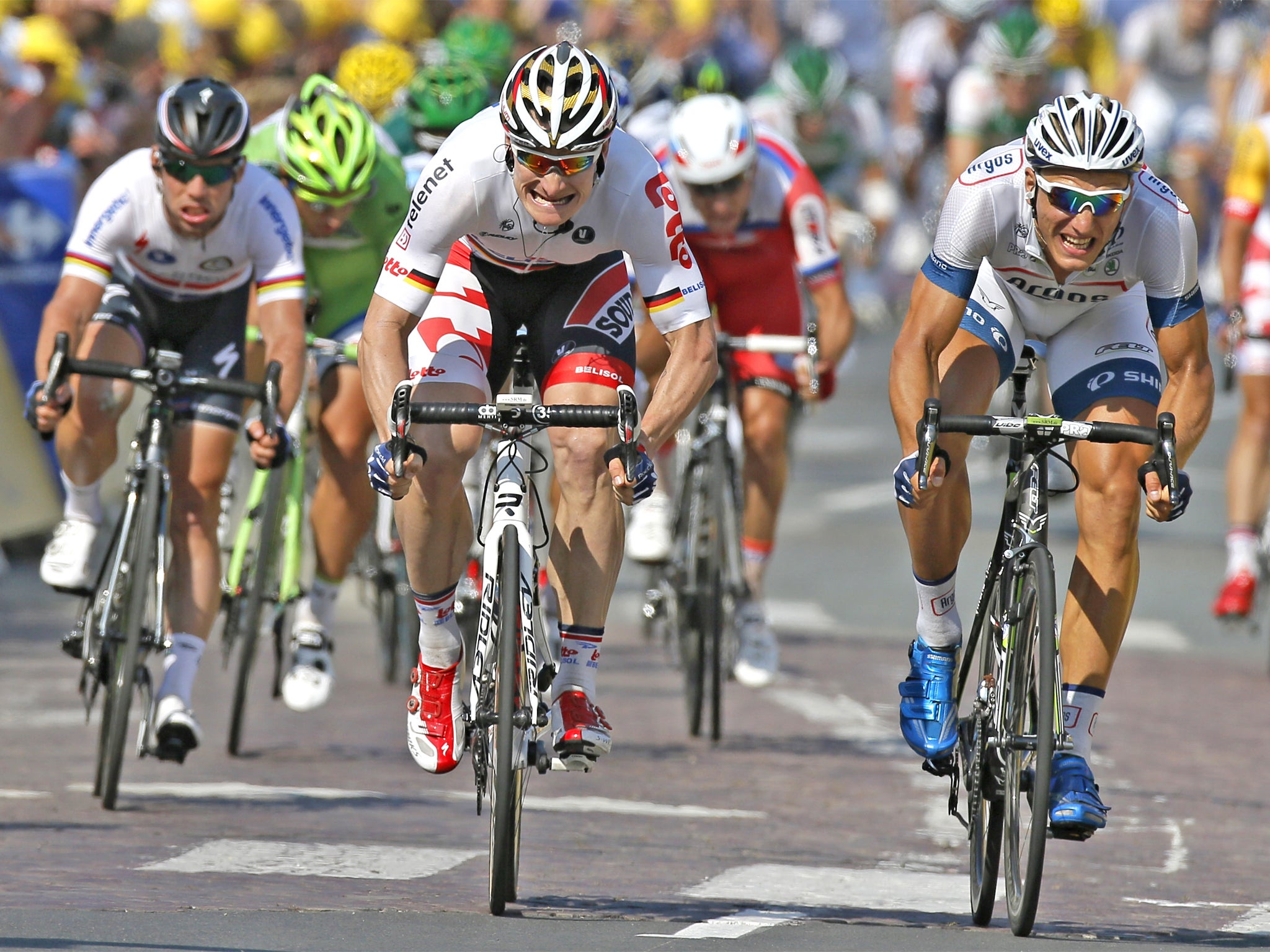Tour de France: Mark Cavendish's charge held back by crash controversy
British sprinter can only finish third but is cleared by officials of forcing Dutch rival off the road

Your support helps us to tell the story
From reproductive rights to climate change to Big Tech, The Independent is on the ground when the story is developing. Whether it's investigating the financials of Elon Musk's pro-Trump PAC or producing our latest documentary, 'The A Word', which shines a light on the American women fighting for reproductive rights, we know how important it is to parse out the facts from the messaging.
At such a critical moment in US history, we need reporters on the ground. Your donation allows us to keep sending journalists to speak to both sides of the story.
The Independent is trusted by Americans across the entire political spectrum. And unlike many other quality news outlets, we choose not to lock Americans out of our reporting and analysis with paywalls. We believe quality journalism should be available to everyone, paid for by those who can afford it.
Your support makes all the difference.Mark Cavendish's usual domination of the Tour de France sprints suffered another setback when a combination of misfiring team tactics, a wind-buffeted finale and a collision conspired to relegate him to third on the 10th stage. Sky's Chris Froome, however, finished in the peloton to retain the overall leader's yellow jersey.
Cavendish's Omega Pharma-Quick Step team tried to take control of the speeding pack in the last six kilometres into Saint-Malo but ended up getting blocked behind. Matters then worsened when the Briton had a speeding side-collision with sprinter Tom Veelers, sending the Dutchman flying. By the time Cavendish regained full acceleration, Marcel Kittel, the winner of the first stage, had beaten fellow German André Greipel to the line, with Cavendish forced to settle for third.
Afterwards Cavendish was accused by Veelers of having caused him to crash, which if officially upheld could have led to him facing a punishment. However, the race jury ruled that Cavendish was not at fault and that the collision had been unintentional.
"I just followed the road, the road went to the left, I just did a normal sprint and I hope Tom is okay," Cavendish said.
However, Veelers was adamant that Cavendish had pushed him intentionally. "I did a sprint to put Marcel Kittel on the front and I was dropping back and suddenly I got ridden off my bike by Mark Cavendish," the Dutchman said. He added that he was covered in cuts and scrapes and that "it was clear from the video [replay]" that he had been "ridden onto the ground" by the Briton.
Kittel, on the other hand, totally disagreed with his team-mate and said that Cavendish was not at fault. "It was very unlucky, Tom was going out [dropping back], Cavendish was going up, their handlebars clashed and he [Veelers] just lost control. I cannot imagine it was on purpose, it's something that just happens sometimes." The race officials agreed and Cavendish was not declassified.
Cavendish's brilliant season prior to this month, taking all five bunch sprints out of a possible five in the Giro d'Italia as well as the points jersey, highlights the contrast with his relatively below-expectations Tour to date, where he has one stage win so far. But it is only disappointing in contrast with Cavendish's usual incredibly high level of performance.
Speaking about what happened tactically in the closing stages, Cavendish said: "[Team-mate and key wing-man Gert] Steegmans took me up to the front a little too early, we'd run out of guys [team-mates], so I tried to get back in [to the main group of sprinters]. Then when I went for it [accelerate], it was too late and there were guys [rivals] ahead of me already. We could have done things a little bit different but that's bike racing."
Team sources told The Independent that Cavendish's fitness was not to blame, despite the early bout of bronchitis that weakened the Briton in the early stages. "There are no excuses, Mark is fine, we just got beat in the good old fashioned way," his Omega manager, Brian Holm, said.
As Cavendish points out, just taking one stage in the Tour is enough to make a rider's career, let alone a season. He already has 24 to his name, including one in this year's Tour, and if his chances of a repeat victory in the points competition look increasingly remote there are still probably three more opportunities on flat stages before the race finishes in Paris for the Briton to make up for earlier disappointments.
For the favourites, meanwhile, tomorrow's 33km time trial in Britanny could see Froome open up his overall advantage to race-winning proportions. The omens could not be better for the Briton, already revealed to be the strongest Tour rider in the mountains even if there are major question marks surrounding his team's collective condition.
In Froome's previous time trial this year, at the Critérium du Dauphiné last month over a similar distance, he put 2min 37sec into Alejandro Valverde, currently his closest rival, and even more into the rest of the overall contenders in the Tour.
"It's definitely a day that could shape the general classification," Froome said, "I will do the best ride I can do, and hopefully I can extend my lead."
Join our commenting forum
Join thought-provoking conversations, follow other Independent readers and see their replies
Comments